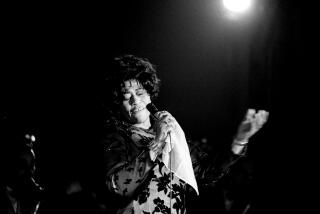VERSATILE JAZZMAN, AND NOT A BAD ACTOR EITHER
- Share via
While the route from sideman to featured soloist to film composer is not all that unusual for those musicians who earn their livelihoods in the studios of Hollywood, it is a rarity indeed for there to be a stop at acting stardom along the way.
Such is the case, however, for the Massachusetts-born jazz musician Ray Pizzi, whose work on saxophone, flute and bassoon has earned him high jazz praise and garnered him most valuable player status in the annals of the National Academy of Recording Arts and Sciences.
“I was doing the saxophone tracks for this movie, ‘End of the Rainbow,’ when the star of the film got another job,” Pizzi recalled recently. “The director (Laszlo Papas) asked me if I acted. I looked him straight back in the eye and said, ‘Of course I act.’ ”
The film, which has won seven international awards, is a short subject based on an old joke popular with musicians: A down-and-out musician (Pizzi), upset over forgetting the middle section of “Over the Rainbow,” leaps from his tenement window, only to hear the arriving ambulance’s siren bleeping out the forgotten melody as he takes his last breath.
While the movie has sparked considerable interest, Pizzi, whose solos have been heard on the sound tracks of such films as “10,” “Grease,” “Return of the Jedi” and “Back to the Future,” has resumed his role as a musical player and currently is gearing toward a bigger part in films--namely, that of composer.
Though his work is familiar to audiences of artists as diverse as Dizzy Gillespie and Ravi Shankar, Willie Bobo and Louis Bellson, Frank Zappa and Henry Mancini, Pizzi’s efforts as a composer-orchestrator will have their debut Monday at a concert at the L.A. Theatre Center.
“From the beginning, when I was a kid watching ‘Peter Gunn,’ I’ve been influenced by Henry Mancini,” Pizzi said. “He’s really been in my corner. I’m very lucky in that respect.”
That influence, according to Pizzi, has resulted in his writing melodies that are, in his own words, pretty. “That’s something I can really do,” said Pizzi, whose own small-group records have produced such memorably pretty melodies as “Willow Creek,” “Espressivo” and “Alicia.”
“I’ve been around a lot of good melodies and some of that rubbed off,” he said, suggesting further that being “Italian and listening to all that opera” also may have played a role in his development.
But his musical influences, whom he once listed as Ravel, Debussy, Charlie Parker and John Coltrane, are not the only influences on his music.
“A lot of guys sit constantly in front of the music stand,” Pizzi said. “I did that too, but it wasn’t until I started living my life--the goods and the bads--that the music started happening.”
A devoted family man (he and his wife, Marilyn, and their two children, Alicia and Michael, live in Van Nuys), Pizzi was trained as a teacher before deciding to make it as a performer. A brief stint with Woody Herman preceded his move to Los Angeles in 1969 to study with the bassoonist Simon Kovar.
“More than teaching me the instrument,” Pizzi said of his former teacher, “he really showed me how to play music.”
While his music was not always showcased as he would have liked it (“My first gig out here was the Body Shop on Sunset Boulevard for a year”), his rise to jazz prominence was steady. So was work on the jazz fringe, as he obtained a staff position on Dinah Shore’s television show which led, oddly enough, to a recording date with Dizzy Gillespie and a contract with the trumpeter’s label, Pablo.
Pizzi has issued several records since then with a variety of small groups. He has also recorded three albums with jazz accordionist Frank Marocco.
But it is the movies that are calling and Pizzi, armed with an orchestrated repertoire, is ready to answer. Or if another starring role comes along, he’s ready for that, too.
More to Read
The biggest entertainment stories
Get our big stories about Hollywood, film, television, music, arts, culture and more right in your inbox as soon as they publish.
You may occasionally receive promotional content from the Los Angeles Times.










